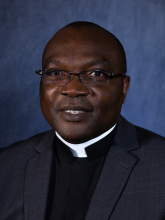
All baptized persons have rights within the Church. The Tribunal exists to vindicate these rights by seeking the truth. It mainly focuses on the annulment of marriages.
Jesus said, "What God has joined together, no one must separate." Thus, Catholics believe that a civil divorce decree does not end a marriage; it merely terminates its civil effects. However, there are cases in which marriages have been entered invalidly, and if this can be proven, it may be possible for the divorced parties to enter other marriages in the Church. The Tribunal's job is to determine whether marriages that have ended in divorce were also invalid.
There are few aspects of Catholic life that raise as many questions and concerns as annulments. There are also very few aspects of Church life that touch so many lives in such an intimate way.
The Tribunal's ministry to separated and divorced persons is intended to be an extension of the healing and reconciling ministry of Jesus Christ toward those who have experienced an unsuccessful marriage. It is also an opportunity for both parties in a marriage to look at themselves, their marriage, and the future and to evaluate these realities in light of the Gospel. At the same time, the Tribunal's ministry to the Church as a whole is to uphold and preserve the integrity of the Sacrament of Matrimony.
Marriage
- What is marriage?
Marriage is a lifelong, sexually exclusive covenant between a man and a woman for the giving and receiving of love and the procreation and education of children.
- Is marriage a sacrament?
Yes, a marriage between a baptized man and a baptized woman is a sacrament.
- What about a marriage involving one or both of the parties who are not baptized?
Although not considered a sacramental marriage, a marriage involving one or both parties who are not baptized is presumed to be valid.
- How can the Church declare a presumably valid marriage null and void?
There are certain marriages that are invalid from their beginning. They are presumably valid because they have the outward appearance of a true marriage. However, because of some impediment, a defect of consent, a lack of freedom, or a problem with the form of the marriage, they are not valid marriages.
- Is the Catholic Church compromising its traditional stand on the sacredness and permanence of marriage by granting so many annulments?
The indissolubility of a marriage remains a central Catholic teaching. In justice, the Church must examine the validity of a marriage when one or both spouses legitimately question it. If it can be shown beyond a reasonable doubt that a marriage was invalid, the Church will issue a decree of nullity to acknowledge that a marriage never in fact took place. However, if invalidity cannot be proven, the Church upholds the sacredness and permanence of marriage by issuing a negative decision.
The Tribunal
- Who runs the Tribunal?
The Tribunal is part of the judicial structure of the Catholic Church. It has many functions. Judging marriage cases is one of them. The daily work of the Tribunal is supervised by the Judicial Vicar who is appointed by the Bishop. The Judicial Vicar must be a priest who is educated in canon law. Other officials of the Tribunal include Judges, Defenders of the Bond, Promotors of Justice, Auditors, Advocates, and Ecclesiastical Notaries. Most cases in the Diocese of Gaylord are decided by a single judge who must be a priest. Marriages lasting twenty-five years or more are assigned to a college of three judges. Since the issuance of Mitis Iudex Dominus Iesus by Pope Francis in 2015, two of the three judges in the college may be lay people.
- How does the Tribunal function?
Anyone who believes that his or her marriage is not valid has the right to challenge its validity. The Tribunal undertakes the investigation of the marriage which is questioned in order to determine the truth. The procedures followed under canon law have been developed over the centuries to allow those who believe their marriage was invalid the opportunity to prove it as fact. The process safeguards the rights of both parties while upholding the dignity and indissolubility of marriage. Unlike a civil divorce proceeding, which is often contentious and painful, the goals of the ecclesial procedures are meant to be healing and grace-filled regardless of the outcome. This is not to deny, however, that some causes of nullity can be contentious and/or painful.
A declaration of nullity does not and cannot dissolve an existing marriage; rather it is an official declaration by the Church that it has been proven beyond a reasonable doubt that a given marriage was invalid from the beginning. When a marriage is invalid, the declaration of nullity is good and just because it recognizes the truth. The same is true when the validity of a marriage is upheld.
- Can anyone obtain a Church annulment?
No. Each case is decided on its own merit. There must be grounds for nullity recognized in Church law. These grounds must be proven to the satisfaction of the judge who is directed by the requirements of the law regarding what constitutes proof. If after examining the gathered evidence the judge believes that he has obtained moral certitude, he may declare the marriage null and void from its inception.
Specific Procedures and Requirements for Requesting an Annulment
- Who petitions the Tribunal for an annulment?
Almost any divorced person can submit a petition. However, petitions usually come from a divorced Catholic party or another previously marriage person who wishes to marry a Catholic in the Catholic Church.
- When can a petition be submitted to the Tribunal?
The Tribunal can be petitioned at any time following the civil divorce.
- To which Tribunal is a petition submitted?
The Tribunal must have jurisdiction or be competent to accept a petition. Competent tribunals include those of the diocese in which the marriage took place, those of the place in which either party to the marriage has a stable residence or domicile, and those in which most of the evidence must be gathered.
- How is a petition submitted to the Tribunal?
A person wishing to submit a petition must do so with the assistance of a parish priest or case sponsor. Normally, the petitioner makes an appointment to meet with the priest or case sponsor to discuss his or her situation (e.g., marriage, divorce, and desire to petition for an annulment). Generally, the priest or case sponsor needs to meet with the petitioner on several occasions to review the required forms and personal summary or libellus. Upon completion, the petitioner and priest or case sponsor will sign the petition. The priest or case sponsor submits the petition and supporting documents as well as a transmittal letter outlining the case being presented.
- What additional documents are required?
In addition to the petition and libellus, recently issued baptismal certificates for both parties (within the last six months for Catholic parties), a certified civil marriage license and certificate of marriage as well as a complete civil divorce decree must be submitted.
- Do the parties have to appear in person at the Tribunal office?
Currently the petitioner and the participating former spouse are interviewed over the telephone and not in person. During the process, the parties will be given the opportunity to review the acts or evidence in the case. The review must take place in person at the Tribunal office in Gaylord. If a party does not reside within the diocese, arrangements will be made for the review to take place in person at the appropriate Tribunal, that is, one close to where the party lives.
- Is a former spouse contacted?
Yes, the respondent receives a copy of the libellus and has the right to participate fully in the process. The Tribunal's failure to contact an available respondent voids the marriage nullity trial.
- What if the former spouse does not participate in the process?
While full participation of both parties is encouraged and helpful for a balanced view of the marriage and the reasons it failed, respondents sometimes choose not to participate. If the testimonies of the petitioner and the witnesses are substantial, the case can often proceed without the respondent’s participation.
- Are witnesses necessary?
Witnesses are very important to the process. Both parties are asked to provide the names and addresses of witnesses – parents, siblings, other relatives, friends and counselors – who can provide testimony to assist in determining whether the invalidity of the marriage can be proven. Witnesses should be chosen on the basis of their ability to be objective, on their knowledge of the facts, and on their knowledge of one or both parties. Before their names are submitted, witnesses should be contacted and should agree to the petitioner’s or respondent’s request to cooperate in the process. Securing the cooperation of witnesses is the responsibility of the party who names them.
- How do witnesses provide testimony?
Witnesses are mailed a packet of materials including a letter, a witness affidavit, a witness questionnaire and a self-addressed envelope. They are requested to provide written testimony of their reflections and insights concerning the marriage.
- What about professional witnesses?
Sometimes doctors, psychiatrists, psychologists, counselors, or other professionals have been consulted before or during a marriage in order to assist a person or a couple. If so, the petitioner and/or the respondent may be asked to sign an authorization which releases these professional witnesses from confidentiality. These witnesses are often very valuable in the study of the marriage in question.
- What happens after the evidence has been gathered?
Once the witness statements and the interview summaries have been gathered, the evidence or acts are published. This means the petitioner and the respondent are notified of the publication and have ten working days within which to contact the Tribunal to set up an appointment to review the evidence. The review must be done in person at the Tribunal. Reviewing the published acts is optional. The parties may choose not to do so. However, this is the final opportunity for each party to submit any additional information they think the court should consider. This step in the process is the Church's way of making sure that all of the available evidence has been collected.
- When is the decision made?
At the end of the publication period, the case is concluded; the Defender of the Bond and the Judge(s) offer their reflections and a decision is rendered. Once the decision is rendered, the parties and the case sponsor are notified in writing. If either party or the Defender of the Bond does not agree with the decision, they may appeal within fifteen (15) working days from the date of the sentence notification. If either party appeals a negative decision and the appeal is denied, no further appeal is possible.
- What happens after an annulment is granted and no appeal is made?
If an affirmative decision is not appealed within fifteen (15) days of the notification, the decision can be acted upon once the appropriate decrees are issued. In short, those receiving an affirmative decision can remarry in the Church provided all other canonical requirements have been met. The need for a second affirmative decision from the Metropolitan Tribunal was eliminated in the issuance of Mitis Iudex Dominus Iesus by Pope Francis.
- What happens if there is an appeal of the Tribunal’s affirmative decision?
That depends on who makes the appeal and the reasons for doing so. In the past, the fact that someone appealed compelled the appeal tribunal to hear the case anew. Recognizing that sometimes an appeal is used merely as a delaying tactic, Pope Francis enabled the appeal tribunals to reject the appeal if there was no obvious reason for it. If the appeal is accepted, the appeal tribunal’s decision determines whether the original affirmative decision can be acted upon.
- If an annulment is granted, does that mean both parties can remarry?
In many cases, once the final decree is issued (which occurs about three weeks after the decision), the parties are free to marry. In some cases, there may be stipulations that must be fulfilled before a Catholic marriage can take place. In some cases, the Tribunal may require professional counseling or an evaluation by a priest or counselor to verify that either or both parties have the proper intentions and are capable of assuming the obligations and responsibilities of marriage. The Church wants to be reasonably certain that the same factors which caused the invalidity of the previous marriage are no longer present.
Frequently Asked Questions
- Does an annulment have any civil effects?
An annulment is a canonical process and has no civil effects.
- Does an annulment affect the legitimacy of children?
The Church considers children to be a gift from God. The law of the Church states that children born of a marriage that is later declared to be invalid are legitimate. Children cannot lose their legitimacy.
- Is there a fee for Tribunal services?
While some Tribunals charge for their services, there is no fee for Tribunal services in the Diocese of Gaylord. The cost of processing a case in the Diocese of Gaylord is paid from funds collected through the annual Catholic Services Appeal (CSA). All members of the diocese are encouraged to support the work of the Church by contributing. No one who is unable to contribute to CSA is denied or discriminated against.
- How long does it take to complete a marriage case?
It can take as much as a year to process a case from the time it is accepted by the Tribunal to the decision. That is the timeframe suggested by the late Pope Francis. It is not guaranteed that all cases will be finished within it. Much depends on the cooperation of persons beyond the Tribunal's control, e.g., the parties to the cases and their witnesses, etc.
- Is an annulment always granted?
No. Unless the judge believes that the grounds have been proven with moral certitude, a negative decision is given.
- Are there some cases which are never able to be completed?
If the parties or witnesses will not cooperate or are not knowledgeable enough to provide testimony relevant to the case, and this cannot be rectified, a Decree of Abandonment may be given. Cases that languish more than six months without any activity are considered abandoned.
- Is a divorced person excommunicated from the Church?
A divorced Catholic is not excommunicated.
- Can a divorced person receive communion?
Nothing prevents a divorced Catholic in the state of grace from receiving the Eucharist. The issue of receiving Communion is not the divorce but any subsequent actions such as a civil marriage or the cohabitation of parties who are not married. Divorced persons may also receive the Sacrament of Penance.
- What about the lack of form annulment?
A lack of form is technically not an annulment since it is an administrative verification of facts; namely, a Catholic was married outside of the Church without a dispensation. It is not a judicial process, and once all of the documents have been received and verified, it can be granted immediately.
- What is the new shorter Process before the Bishop?
There are three strict conditions which must be met for these rare and exceptional cases to be accepted. First, both spouses have to petition together, or the non-petitioning party must at least consent to the petition. Second, the nullity of the marriage must be obvious. Third, all the facts that make the marriage obviously null have to be readily available. Unlike the documentary process, the process before the Bishop can involve the questioning of both parties and knowledgeable witnesses, but this is to be done all in one session whenever possible. If any of the three conditions are missing, the case must be tried in the ordinary process.
The experience in the Diocese of Gaylord has been that the so-called shorter process before the bishop actually takes about as long or even longer than the ordinary marriage nullity trial. Hence, the use of this procedure is discouraged.













